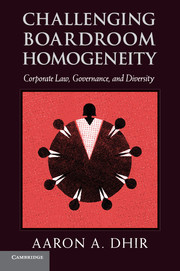Crossref Citations
This Book has been
cited by the following publications. This list is generated based on data provided by Crossref.
Adams, Renée B.
de Haan, Jakob
Terjesen, Siri
and
van Ees, Hans
2015.
Board Diversity: Moving the Field Forward.
Corporate Governance: An International Review,
Vol. 23,
Issue. 2,
p.
77.
Terjesen, Siri
and
Sealy, Ruth
2016.
Board Gender Quotas: Exploring Ethical Tensions From A Multi-Theoretical Perspective.
Business Ethics Quarterly,
Vol. 26,
Issue. 1,
p.
23.
Andersen, Nicolai
and
Börsch, Alexander
2016.
Wie Controlling Innovationen richtig fördert.
Controlling & Management Review,
Vol. 60,
Issue. 3,
p.
58.
Jacobi, Tonja
and
Rozema, Kyle
2017.
Judicial Conflicts and Voting Agreement: Evidence from Interruptions at Oral Argument.
SSRN Electronic Journal ,
Mehta, Sangeeta
Burns, Karen E. A.
Machado, Flavia R.
Fox-Robichaud, Alison E.
Cook, Deborah J.
Calfee, Carolyn S.
Ware, Lorraine B.
Burnham, Ellen L.
Kissoon, Niranjan
Marshall, John C.
Mancebo, Jordi
Finfer, Simon
Hartog, Christiane
Reinhart, Konrad
Maitland, Kathryn
Stapleton, Renee D.
Kwizera, Arthur
Amin, Pravin
Abroug, Fekri
Smith, Orla
Laake, Jon H.
Shrestha, Gentle S.
and
Herridge, Margaret S.
2017.
Gender Parity in Critical Care Medicine.
American Journal of Respiratory and Critical Care Medicine,
Vol. 196,
Issue. 4,
p.
425.
Dworkin, Terry M.
Schipani, Cindy A.
Milliken, Frances J.
and
Kneeland, Madeline K.
2018.
Assessing the Progress of Women in Corporate America: The More Things Change, the More They Stay the Same.
American Business Law Journal,
Vol. 55,
Issue. 4,
p.
721.
Harding, Michelle
and
Lemayian, Zawadi
2018.
SEC Regulation S-K and Board Diversity.
SSRN Electronic Journal ,
Seck, Sara L.
2019.
Relational Law and the Reimagining of Tools for Environmental and Climate Justice.
Canadian Journal of Women and the Law,
Vol. 31,
Issue. 1,
p.
151.
KOWALEWSKA, HELEN
2020.
Bringing Women on Board: The Social Policy Implications of Gender Diversity in Top Jobs.
Journal of Social Policy,
Vol. 49,
Issue. 4,
p.
744.
Burel, Simone
2020.
Quick Guide Female Leadership.
p.
11.
van Daalen, Kim Robin
Bajnoczki, Csongor
Chowdhury, Maisoon
Dada, Sara
Khorsand, Parnian
Socha, Anna
Lal, Arush
Jung, Laura
Alqodmani, Lujain
Torres, Irene
Ouedraogo, Samiratou
Mahmud, Amina Jama
Dhatt, Roopa
Phelan, Alexandra
and
Rajan, Dheepa
2020.
Symptoms of a broken system: the gender gaps in COVID-19 decision-making.
BMJ Global Health,
Vol. 5,
Issue. 10,
p.
e003549.
Sicoli, Graziella
Bronzetti, Giovanni
Ippolito, Dominga
and
Leonetti, Giada
2020.
Gender diversity and governance: Analysis of Italian listed companies.
Corporate Ownership and Control,
Vol. 17,
Issue. 4, Special Issue,
p.
329.
Johnson, Genevieve Fuji
and
Howsam, Robert
2020.
Whiteness, Power and the Politics of Demographics in the Governance of the Canadian Academy.
Canadian Journal of Political Science,
Vol. 53,
Issue. 3,
p.
676.
Ruzycki, Shannon M
Franceschet, Susan
and
Brown, Allison
2021.
Making medical leadership more diverse.
BMJ,
p.
n945.
Pérez Troya, Adoración
2021.
The Fourth Industrial Revolution and Its Impact on Ethics.
p.
33.
Blomson, Dean
2021.
Thinking outside the governance box to the board of the future: Exploring “fit-for-future-purpose” governance operating models.
Corporate Board role duties and composition,
Vol. 17,
Issue. 2,
p.
18.
Noureldin, Neveen
and
Basuony, Mohamed A. K.
2022.
Females on board and sustainability performance in a developing country: Evidence from Egypt.
Corporate Ownership and Control,
Vol. 19,
Issue. 1, special issue,
p.
288.
Bronzetti, Giovanni
Rija, Maurizio
Sicoli, Graziella
and
Anna Ippolito, Dominga
2022.
Diversità di genere e sistema sanitario: un'analisi su un campione di aziende sanitarie italiane.
MECOSAN,
p.
63.
Ferrari, Giulia
Ferraro, Valeria
Profeta, Paola
and
Pronzato, Chiara
2022.
Do Board Gender Quotas Matter? Selection, Performance, and Stock Market Effects.
Management Science,
Vol. 68,
Issue. 8,
p.
5618.
Radu, Camélia
and
Smaili, Nadia
2022.
Board Gender Diversity and Corporate Response to Cyber Risk: Evidence from Cybersecurity Related Disclosure.
Journal of Business Ethics,
Vol. 177,
Issue. 2,
p.
351.





